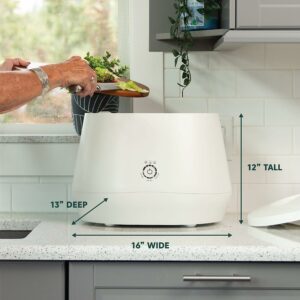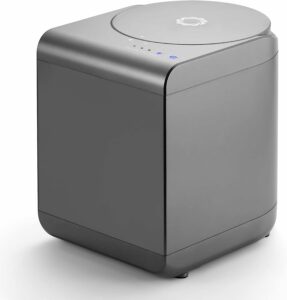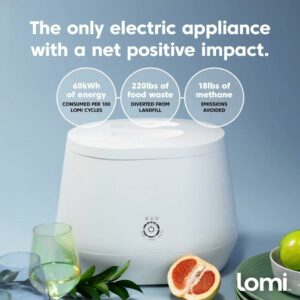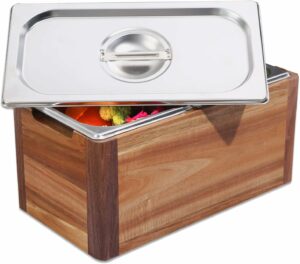The Ultimate Guide: Choosing the Best Compost Bin for Your Apartment
Introduction
Composting has gained significant popularity as more people strive to adopt sustainable practices and reduce waste.
Even if you live in an apartment, you can still contribute to the composting movement.
A compost bin in your apartment allows you to transform food scraps into nutrient-rich soil amendments for indoor plants or community gardens.
This guide will provide valuable insights and considerations for choosing the best compost bin for your apartment, ensuring you make an informed decision that suits your space and lifestyle.
Provo Green Products embodies a beacon of trust in the realm of sustainable discoveries, offering choices that enhance your life and leave a positive mark on our planet.
Leveraging extensive expertise in manufacturing, construction, and various trades, we provide a solid foundation for sustainable living.
Our meticulous research process guarantees that our information about each product is precise and current, allowing you to make informed decisions.
Whether your interest lies in solar products, electric bikes, or other eco-friendly alternatives, our commitment to credibility ensures you have access to dependable insights, guiding your journey toward a more sustainable lifestyle.
Provo Green Products is your go-to destination for finding the right green products for your lifestyle.
Disclosure: We may earn a small commission if you click on one of our links.
This does not affect the pricing of the product whatsoever.
Considerations for Apartment Composting
When it comes to apartment composting, several factors need to be taken into account to ensure successful and hassle-free composting.
Space limitations and container size: As an apartment dweller, you have limited space for your composting setup.
Consider the size and dimensions of the compost bin to ensure it fits within your available space, such as under the sink or on a countertop.
Opting for a compact and space-efficient design will make integrating composting into your apartment lifestyle easier.
Odor control and composting methods: Living close to neighbors requires being mindful of potential odor issues.
Look for compost bins with practical odor control features, such as airtight seals or carbon filters.
Additionally, consider the composting method that suits your needs:
Traditional aerobic composting, worm composting (vermicomposting), or anaerobic composting with a bokashi system.
Ease of use and maintenance: Apartment composting should be convenient and hassle-free.
Choose a compost bin that is easy to use and maintain, with features like a removable inner bucket for effortless emptying and cleaning.
Consider whether the bin has a handle or wheels for easy maneuverability, especially if you plan to move it around within your apartment.

Types of Compost Bins for Apartments
Depending on your apartment setup and personal preferences, various compost bin options exist:
Indoor compost bins: Indoor compost bins are designed to fit seamlessly into apartment living spaces.
Countertop compost bins: These small, portable compost bins are perfect for collecting daily kitchen scraps.
They typically have a compact size and sleek design, allowing them to blend in with your kitchen decor.
Under-sink compost bins: An under-sink compost bin can be a great choice if you have cabinet space under your sink.
These bins are usually odor-proof and fit neatly beneath your sink, keeping your kitchen tidy.
Worm composting bins: Vermicomposting is an excellent option for apartment dwellers who want to compost organic waste using worms.
Worm composting bins, also known as wormeries, provide a controlled environment for worms to break down food scraps into nutrient-rich castings (worm compost).
Outdoor compost bins: If you can access an outdoor space like a balcony or patio, you can consider outdoor compost bin options.
Balcony compost bins: These bins are designed for apartment balconies and have compact footprints.
They often come with features like pest-proofing and easy access for adding and turning the compost.
Tumbler compost bins: They are a popular choice for apartment composting due to their efficient and compact design.
They allow for easy turning and mixing of the compost, ensuring faster decomposition.
Bokashi composting systems: Bokashi composting is an anaerobic fermentation process that utilizes a specialized technique and bran to break down food waste.
Bokashi composting systems are compact and can be used indoors, making them ideal for apartment dwellers.

Features to Look for in a Compost Bin
To make an informed decision, consider the following features when selecting a compost bin for your apartment:
Capacity and volume: Determine the amount of organic waste you generate regularly and choose a compost bin with an appropriate capacity.
If you produce a significant amount of food scraps, opt for a bin with a larger volume to accommodate your needs. However, remember that larger bins may require more space in your apartment.
Ventilation and airflow: Adequate ventilation is crucial for proper composting.
Look for a compost bin that allows for adequate airflow to prevent unpleasant odors and promote the breakdown of organic matter.
Some bins have built-in ventilation systems or perforations to facilitate airflow and maintain optimal composting conditions.
Durability and material: Consider the durability of the compost bin, as it should withstand the rigors of composting over an extended period.
Look for bins made from sturdy materials like high-density polyethylene (HDPE) plastic or stainless steel.
These materials are durable, weather-resistant, and lightweight.
Aesthetics and design: While functionality is essential, choosing a compost bin that complements your apartment’s aesthetic doesn’t hurt.
There are various designs and colors available to suit different preferences and styles.
Opting for a visually appealing compost bin can make it more enjoyable to incorporate composting into your daily routine.

Maintaining and Troubleshooting Your Apartment Compost Bin
To ensure successful composting in your apartment, it’s vital to maintain your compost bin properly.
Here are some maintenance tips and troubleshooting techniques:
Managing compost moisture and balance: Compost should ideally have a moisture content similar to a wrung-out sponge.
Monitor the moisture level regularly and adjust it as needed.
If the compost is too dry, add a bit of water; conversely, mix in dry materials like shredded newspaper or dried leaves if it’s too wet.
Maintaining a balanced ratio of green (nitrogen-rich) and brown (carbon-rich) materials is also crucial for proper decomposition.
Preventing and managing odor issues: While choosing a compost bin with odor control features helps, there are additional steps you can take to prevent and contain odors.
Avoid adding overly pungent or oily food scraps, and ensure proper aeration by turning the compost regularly. Adding a layer of browns, such as shredded paper or dry leaves, on top of each food waste layer can also help control odors.
Troubleshooting common problems: If you encounter issues like a foul smell, fruit flies, or slow decomposition, there are several troubleshooting techniques to address them.
For odor problems, ensure proper aeration, maintain the right moisture balance, and consider adding carbon-rich materials.
To eliminate fruit flies, cover your food scraps with a layer of brown and avoid overfilling the bin.
If decomposition is slow, check the moisture levels, ensure proper airflow, and adjust the carbon-to-nitrogen ratio by adding more greens or browns as necessary.
Composting Tips for Apartment Dwellers
Here are some additional tips to enhance your composting experience as an apartment dweller:
What to compost and avoid: Apartment composting can be limited by space, so focus on composting fruit and vegetable scraps, coffee grounds, tea leaves, and eggshells.
Avoid composting meat, dairy products, oily foods, and pet waste, as they can attract pests and cause odor issues.
Managing composting in small spaces: If space is limited, consider using smaller compost bins or methods like vermicomposting or bokashi composting.
These methods are well-suited for compact living spaces and have a smaller footprint.
Harvesting and using compost in apartment gardening: Once your compost has fully decomposed, it’s time to harvest it and put it to use.
Use the compost to nourish your indoor plants or balcony garden, or donate it to your area’s community gardens or urban farms.
Compost adds valuable nutrients to the soil, promoting healthy plant growth.

Sustainable Alternatives to Traditional Compost Bins
If traditional compost bins don’t suit your apartment living situation, there are alternative composting methods to consider:
Indoor composting with vermicomposting: Vermicomposting utilizes worms to break down food waste.
A worm composting bin can be kept indoors and doesn’t require much space.
The worms efficiently convert food scraps into nutrient-rich worm castings, which can be used as fertilizer.
Bokashi composting systems: Bokashi composting is an anaerobic fermentation process that relies on a specialized system and bran to break down organic waste.
Bokashi systems are compact and suitable for indoor use.
The fermented waste can later be buried in outdoor soil or added to a traditional compost bin for further decomposition.
Community composting options: Check if your apartment complex or local community has a composting program.
Some communities have shared composting facilities where you can contribute your food scraps.
This option allows you to compost responsibly even if you lack the space or resources for your compost bin.
Frequently Asked Questions about Apartment Compost Bins
- Can I compost in an apartment without a balcony? Yes, you can compost in an apartment even without a balcony. Several indoor composting options are available, such as countertop compost bins, under-sink compost bins, and vermicomposting (worm composting) bins. These compact solutions are designed to fit within the limited space of an apartment.
- How often should I empty the compost bin? The frequency of emptying your compost bin depends on its size, composting volume, and composting method. Smaller countertop or under-sink compost bins may require more frequent emptying, every few days or once a week. Worm composting bins typically have a slower decomposition process, so that you may empty them every few months. Monitor the level of decomposition and adjust your emptying schedule accordingly.
- Can I compost in an apartment without worms? Yes, you can compost in an apartment without worms. While vermicomposting is a popular method for apartment composting, there are other options. You can choose various composting methods, such as traditional aerobic composting with a compost bin or anaerobic composting with a bokashi system. These methods rely on microorganisms and natural decomposition processes to break down organic waste.
Conclusion
Choosing the best compost bin for your apartment is essential to adopting sustainable practices and reducing your ecological footprint.
Consider the space limitations, composting method, and features that suit your needs.
Whether you opt for a compact countertop bin, an under-sink solution, or an outdoor balcony bin, remember to maintain proper moisture levels, manage odors, and troubleshoot any issues that may arise.
With the correct compost bin and a commitment to composting, you can transform your kitchen scraps into valuable nutrient-rich compost, contributing to a greener and more sustainable future.
Stay in Touch!
I’am a dedicated entrepreneur with many years of experience and an integrity-driven individual who is highly motivated to succeed. Leveraging extensive expertise in manufacturing, construction, and various trades, we can provide a solid foundation for sustainable living. Our meticulous research process guarantees that our information about each product is precise and current, allowing you to make informed decisions. A deep understanding of business operations empowers me to consistently implement improvements that result in ongoing success. Visit site.
